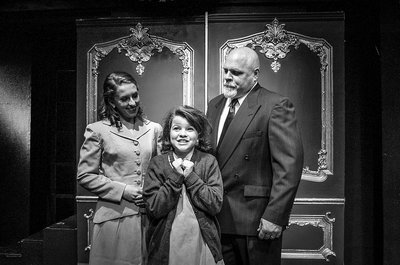
There’s something fuzzy and bittersweet about that old populist daydream of an adorable orphan so possessed by optimism that her mere presence can sand down the rough edges of a capitalist tycoon and compel an embattled president to launch the New Deal.
If that’s not a political fairy tale for a bygone era, I don’t know what is.
They used to say, way back when, that prosperity was right around the corner, and it’s that tart truism that drives the story of Annie, the beloved musical about a poor, parentless redhead who is rescued from a crowded orphanage by Daddy Warbucks, an über-rich Manhattan financier whose sphere of influence extends to F.D.R.’s inner circle.
Actors Cabaret’s current production, directed by Michael P. Watkins, is a real pip, full of cute kids and strong character actors who somehow locate the atavistic spirit of boosterism and rugged good cheer that Broadway spun into the cobwebs of the miasmic 1970s, when this musical based on the Depression-era comic strip first opened.
ACE’s reputation for strong casting and solid ensemble work is everywhere evident here: As Annie, 11-year-old Kenady Conforth is a ringer, all talent and charm; Tony Joyner makes a strong and sympathetic Warbucks; and on down the line, to Hank Wilson’s hilarious Roosevelt, Sue Schroeder-White’s kniving Miss Hannigan and Cody Mendonca’s slimy villain Rooster. With its rousing song-and-dance numbers and its rags-to-riches flash, Annie makes for solid holiday entertainment.
Yes, this show has something for the whole family, even if those family members, like me, tend to cast a suspicious eye on the prevailing myths of American history. In this sense, Annie is a fascinating study in collective self-reflection — a warped antique mirror held up to the visage of what we’ve become. The show is at once sweetly irrelevant (Warbucks has become Halliburton, and the streets have become our orphanage) and hyper-relevant, if only because it reveals how much the sugar coating has been scraped from the bitter pill of the American dream.
Because, really, there are no more angels in our America, if there ever were. We’ve swapped Depression-era naifs like Lil’ Orphan Annie and Charlie Chaplin’s Tramp for a dialectic of recrimination and narcissistic cant, and the best we can come up with now, in terms of popular myths, is idiocy on the one hand and cynicism on the other. Annie herself simply couldn’t survive modern capitalism, with its insidious corporate feudalism hiding behind a shiny smile of benevolent consumerism. All our orphans are junkies these days.
Instead of redheads named Annie reflecting our better selves, we take selfies. Instead of security, we get stuff. Instead of New Deals, we get no deals.
Annie plays through Dec. 20 at Actors Cabaret of Eugene; 683-4368; $16-$42.95.